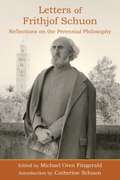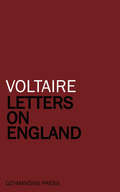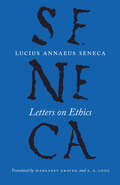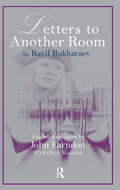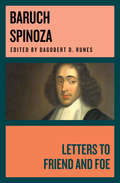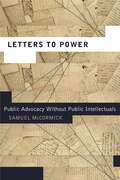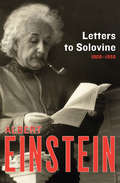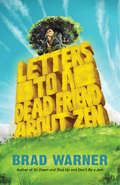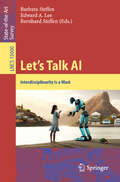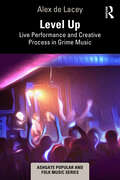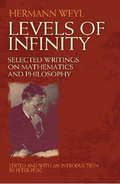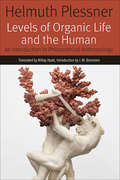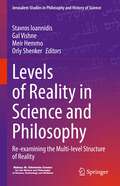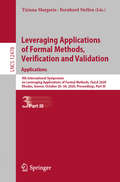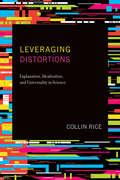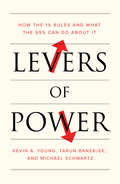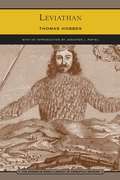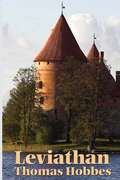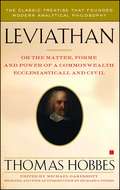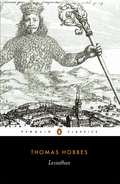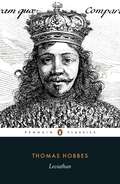- Table View
- List View
Letters of Frithjof Schuon: Reflections on the Perennial Philosophy
by Frithjof SchuonThis collection of letters by Frithjof Schuon, the foremost spokesman of the perennial philosophy, contains nearly 200 newly translated letters from Schuon&’s youth to old age as written to friends, spiritual seekers, scholars, and others. Among the letters are those that address, in a simpler and more accessible manner, the same metaphysical subjects that continually recur in Schuon&’s published works. Other letters relate to the spiritual life in its simple and concrete aspects, by answering such fundamental questions as &“Why is there evil in the world?&”, &“How can I recognize if I am on a wrong path?&”, and &“What should I do to be saved?&” Finally, there are letters that relate to various aspects of Schuon&’s life, most of which were written to his closest friends. While not a comprehensive autobiography, these letters offer an intimate view of certain key moments in his life. Taken as a whole, the present collection of letters offers insights into the content of Frithjof Schuon&’s message—his exposition of the perennial philosophy—as well as a glimpse into his life as messenger of that philosophy.
Letters on England
by VoltaireFrançois Marie Arouet, who called himself Voltaire, was the son of François Arouet of Poitou, who lived in Paris, had given up his office of notary two years before the birth of this his third son, and obtained some years afterwards a treasurer’s office in the Chambre des Comptes. Voltaire was born in the year 1694. He lived until within ten or eleven years of the outbreak of the Great French Revolution, and was a chief leader in the movement of thought that preceded the Revolution. Though he lived to his eighty-fourth year, Voltaire was born with a weak body. His brother Armand, eight years his senior, became a Jansenist.
Letters on Ethics: To Lucilius (The Complete Works of Lucius Annaeus Seneca)
by Lucius Annaeus Seneca A. A. Long Margaret GraverThe Roman statesman and philosopher Seneca (4 BCE-65 CE) recorded his moral philosophy and reflections on life as a highly original kind of correspondence. Letters on Ethics includes vivid descriptions of town and country life in Nero's Italy, discussions of poetry and oratory, and philosophical training for Seneca's friend Lucilius. This volume, the first complete English translation in nearly a century, makes the Letters more accessible than ever before. Written as much for a general audience as for Lucilius, these engaging letters offer advice on how to deal with everything from nosy neighbors to sickness, pain, and death. Seneca uses the informal format of the letter to present the central ideas of Stoicism, for centuries the most influential philosophical system in the Mediterranean world. His lively and at times humorous expositions have made the Letters his most popular work and an enduring classic. Including an introduction and explanatory notes by Margaret Graver and A. A. Long, this authoritative edition will captivate a new generation of readers.
Letters to Another Room
by Ravil BukharaevThis is a beautiful translation by John Farndon (with Olga Nakston) of the late Ravil Bukharaev’s literary existential novel memoir in which he explains to his wife how his Muslim faith and ideals influenced both his love for her and his understanding of life and self, particularly his quest for truth and ‘authenticity’. Throughout their long marriage, the writers and poets Ravil Bukharaev and Lydia Grigorieva had written in separate rooms in their home. In this deeply-felt and poetic memoir, Ravil writes to Lydia in order to try explain (at last) things left unsaid over the years. With immense honesty and insight, he explores how their journey together has been shaped by his profound Muslim beliefs and his lifelong search for what is authentic and true. Along the way, he creates finely defined and moving vignettes of eight very different people struggling to find meaning in their lives, from old Elizaveta Osipovna, alone in her Moscow flat, to proud Arzhana coping with a tough life in the Altai mountains.
Letters to Friend and Foe
by Baruch SpinozaLetters that appear in this volume cover only the last two decades of Spinoza&’s life and represent a mere fraction of the immense correspondence he carried on during his lifetime.
Letters to Friend and Foe
by Baruch SpinozaLetters that appear in this volume cover only the last two decades of Spinoza&’s life and represent a mere fraction of the immense correspondence he carried on during his lifetime.
Letters to Power: Public Advocacy Without Public Intellectuals (Rhetoric and Democratic Deliberation #2)
by Samuel McCormickAlthough the scarcity of public intellectuals among today’s academic professionals is certainly a cause for concern, it also serves as a challenge to explore alternative, more subtle forms of political intelligence. Letters to Power accepts this challenge, guiding readers through ancient, medieval, and modern traditions of learned advocacy in search of persuasive techniques, resistant practices, and ethical sensibilities for use in contemporary democratic public culture. At the center of this book are the political epistles of four renowned scholars: the Roman Stoic Seneca the Younger, the late-medieval feminist Christine de Pizan, the key Enlightenment thinker Immanuel Kant, and the Christian anti-philosopher Søren Kierkegaard. Anticipating much of today’s online advocacy, their letter-writing helps would-be intellectuals understand the economy of personal and public address at work in contemporary relations of power, suggesting that the art of lettered protest, like letter-writing itself, involves appealing to diverse, and often strictly virtual, audiences. In this sense, Letters to Power is not only a nuanced historical study but also a book in search of a usable past.
Letters to Sartre
by Simone De Beauvoir Quintin HoareLetters written by Simone de Beauvoir to one of the world's most acclaimed philosophers shed light on their relationship and her obsessive need to communicate with him.
Letters to Solovine, 1906–1955
by Albert EinsteinA provocative collection of letters to his longtime friend and translator that spans Einstein&’s career and reveals the inner thoughts and daily life of a transformative geniusFrom their early days as tutor and scholar discussing philosophy over Spartan dinners to their work together to publish Einstein&’s books in Europe, in Maurice Solovine, Albert Einstein found both an engaged mind and a loyal friend. While Einstein frequently shared his observations on science, politics, philosophy, and religion in his correspondence with Solovine, he was just as likely to express his feelings about everyday life—his health and the effects of aging and his experiences in the various places where he settled and visited in his long career. The letters are both funny and frank, and taken together, reflect the changes—large and small—that took place over a half century and in the remarkable life of the world&’s foremost scientist. Published in English alongside the German text and accompanied by facsimile copies of the original letters, the collected Letters to Solovine offers scholar and interested reader alike unprecedented access to the personal life of Albert Einstein. This authorized ebook features a new introduction by Neil Berger, PhD, and an illustrated biography of Albert Einstein, which includes rare photos and never-before-seen documents from the Albert Einstein Archives at the Hebrew University of Jerusalem.
Letters to Solovine, 1906–1955: 1906–1955 (Paperback Ser.)
by Albert EinsteinA provocative collection of letters to his longtime friend and translator that spans Einstein&’s career and reveals the inner thoughts and daily life of a transformative geniusFrom their early days as tutor and scholar discussing philosophy over Spartan dinners to their work together to publish Einstein&’s books in Europe, in Maurice Solovine, Albert Einstein found both an engaged mind and a loyal friend. While Einstein frequently shared his observations on science, politics, philosophy, and religion in his correspondence with Solovine, he was just as likely to express his feelings about everyday life—his health and the effects of aging and his experiences in the various places where he settled and visited in his long career. The letters are both funny and frank, and taken together, reflect the changes—large and small—that took place over a half century and in the remarkable life of the world&’s foremost scientist. Published in English alongside the German text and accompanied by facsimile copies of the original letters, the collected Letters to Solovine offers scholar and interested reader alike unprecedented access to the personal life of Albert Einstein. This authorized ebook features a new introduction by Neil Berger, PhD, and an illustrated biography of Albert Einstein, which includes rare photos and never-before-seen documents from the Albert Einstein Archives at the Hebrew University of Jerusalem.
Letters to a Dead Friend about Zen
by Brad WarnerThe night Brad Warner learns that his childhood friend Marky has died, Warner is about to speak to a group of Zen students in Hamburg, Germany. It’s the last thing he feels like doing. What he wants to do instead is tell his friend everything he never said, to explain Zen and what he does for a living and why he spends his time “Sitting. Sitting. Sitting. Meditating my life away as it all passes by. Lighting candles and incense. Bowing to nothing.” So, as he continues his teaching tour through Europe, he writes to his friend all the things he wishes he had said. Simply and humorously, he reflects on why Zen provided him a lifeline in a difficult world. He explores grief, attachment, and the afterlife. He writes to Marky, “I’m not all that interested in Buddhism. I’m much more interested in what is true,” and then proceeds to poke and prod at that truth. The result for readers is a singular and winning meditation on Zen — and a unique tribute to both a life lost and the one Warner has found.
Let’s Talk AI: Interdisciplinarity Is a Must (Lecture Notes in Computer Science #15000)
by Bernhard Steffen Edward A. Lee Barbara SteffenThis unique open access volume represents an interdisciplinary dialog with top-class researchers and practitioners on the Artificial Intelligence revolution. The contributions derive from structured interviews with community leaders who examine recent developments in AI and offer predictions about its impact on science, technology, business, and society. The interviewees, leading thinkers and practitioners from fields such as Computer Science, Software Engineering, Philosophy, Psychology, and Law, gathered at the multidisciplinary event AISoLA, where they discussed developments in AI technologies, tools, and research, and these exchanges were shaped into this coherent survey. In the debates surrounding the rapid advancement of AI it&’s clear that while there is much sharing of ideas, in fact true cooperation and alignment is rare, most fields still operate in silos. Given the pervasive nature of AI, it&’s critical that we move forward carefully to ensure that our decisions and progress are well-considered. This book serves as a call to action, reminding us of our collective responsibility to shape the future. The authors offer points of agreement and contrast, the reader will better understand how we may still maintain control over technological progress in AI and its societal impact.
Level Up: Live Performance and Creative Process in Grime Music (Ashgate Popular and Folk Music Series)
by Alex de LaceyGrime music has been central to British youth culture since the beginning of the 21st century. Performed by MCs and DJs, it is an Afrodiasporic form that developed on street corners, on pirate radio and at raves. Level Up: Live Performance and Creative Process in Grime Music offers the first long-form ethnographic study of grime practice; it questions how and why artists do what they do; and it asks what this can tell us about creative process and improvisation more widely. Based on research conducted in London’s grime scene—facilitated by the author’s long-standing role as a DJ and broadcaster—this book explores the form’s emergence before taking a magnifying glass to the contemporary scene and its performance protocol, exploring the practice of key artists and their crews living and working in the city. The resultant model of creative interaction provides a comprehensive mapping of collective social learning in London’s informal cityscape, offering new ways to conceptualise improvisatory practice within ensembles.
Levels of Infinity: Selected Writings on Mathematics and Philosophy (Dover Books on Mathematics)
by Hermann Weyl Peter PesicThis original anthology collects 10 of Weyl's less-technical writings that address the broader scope and implications of mathematics. Most have been long unavailable or not previously published in book form. Subjects include logic, topology, abstract algebra, relativity theory, and reflections on the work of Weyl's mentor, David Hilbert. 2012 edition.
Levels of Organic Life and the Human: An Introduction to Philosophical Anthropology (Forms of Living)
by Helmuth PlessnerThe most important work by a key figure in German thought, Helmuth Plessner’s Levels of Organic Life and the Human, originally published in 1928, appears here for the first time in English, accompanied by a substantial Introduction by J. M. Bernstein, after having served for decades as an influence on thinkers as diverse as Merleau-Ponty, Peter Berger, Habermas, and the new naturalists.The Levels, as it has long been known, draws on phenomenological, biological, and social scientific sources as part of a systematic account of nature, life, and human existence. The book considers non-living nature, plants, non-human animals, and human beings in turn as a sequence of increasingly complex modes of boundary dynamics—simply put, interactions between a thing’s insides and surrounding world. On Plessner’s unique account, living things are classed and analyzed by their “positionality,” or orientation to and within an environment. “Life” is thereby phenomenologically defined, and its universal yet internally variable features such as metabolism, reproduction, and death are explained.The approach provides a foundation not only for philosophical biology but philosophical anthropology as well. According to Plessner’s radical view, the human form of life is excentric—that is, the relation between body and environment is something to which humans themselves are positioned and can take a position. This “excentric positionality” enables human beings to take a stand outside the boundaries of their own body, a possibility with significant implications for knowledge, culture, religion, and technology.Plessner studied zoology and philosophy with Hans Driesch in the 1910s before embarking on a highly productive philosophical career. His work was initially obscured by the superficially similar views of Max Scheler and Martin Heidegger and by his forced exile during World War II. Only in recent decades, as scholarship has moved more squarely into engagement with issues like animality, embodiment, human dignity, social theory, the philosophy of technology, and the philosophy of nature, has the originality and depth of Plessner’s vision been appreciated.A powerful and sophisticated account of embodiment, the Levels shows, with reference both to science and to philosophy, how life can be seen on its own terms to establish its own boundaries, and how, from the standpoint of life, the human establishes itself in relation to the nonhuman. As such, the book is not merely a historical monument but a source for invigorating a range of vital current conversations around the animal, posthumanism, the material turn, and the biology and sociology of cognition.This modern philosophical classic, long-awaited in English translation, is a key book both historically and for today’s interest in understanding philosophy and social theory together with science, without reducing the former to the latter.
Levels of Reality in Science and Philosophy: Re-examining the Multi-level Structure of Reality (Jerusalem Studies in Philosophy and History of Science)
by Meir Hemmo Orly Shenker Stavros Ioannidis Gal VishneThis book offers a unique perspective on one of the deepest questions about the world we live in: is reality multi-leveled, or can everything be reduced to some fundamental ‘flat’ level? This deep philosophical issue has widespread implications in philosophy, since it is fundamental to how we understand the world and the basic entities in it. Both the notion of ‘levels’ within science and their ontological implications are issues that are underexplored in the philosophical literature. The volume reconsiders the view that reality contains many levels and opens new ways to understand the ontological status of the special sciences. The book focuses on major open questions that arise at the foundations of cognitive science, cognitive psychology, brain science and other special sciences, in particular with respect to the physical foundations of these sciences. For example: Is the mental computational? Do brains compute? How can the special sciences be autonomous from physics, grounded in, or based on, physics and at the same time irreducible to physics? The book is an important read for scientists and philosophers alike. It is of interest to philosophers of science, philosophers of mind and biology interested in the notion of levels, but also to psychologists, cognitive scientists and neuroscientists investigating such issues as the precise relation of the mental to the underlying neural structures and the appropriate approach to study it.
Leveraging Applications of Formal Methods, Verification and Validation: 9th International Symposium on Leveraging Applications of Formal Methods, ISoLA 2020, Rhodes, Greece, October 20–30, 2020, Proceedings, Part III (Lecture Notes in Computer Science #12478)
by Tiziana Margaria Bernhard SteffenThe three-volume set LNCS 12476 - 12478 constitutes the refereed proceedings of the 9th International Symposium on Leveraging Applications of Formal Methods, ISoLA 2020, which was planned to take place during October 20–30, 2020, on Rhodes, Greece. The event itself was postponed to 2021 due to the COVID-19 pandemic. The papers presented were carefully reviewed and selected for inclusion in the proceedings. Each volume focusses on an individual topic with topical section headings within the volume:Part I, Verification Principles: Modularity and (De-)Composition in Verification; X-by-Construction: Correctness meets Probability; 30 Years of Statistical Model Checking; Verification and Validation of Concurrent and Distributed Systems. Part II, Engineering Principles: Automating Software Re-Engineering; Rigorous Engineering of Collective Adaptive Systems. Part III, Applications: Reliable Smart Contracts: State-of-the-art, Applications, Challenges and Future Directions; Automated Verification of Embedded Control Software; Formal methods for DIStributed COmputing in future RAILway systems.
Leveraging Distortions: Explanation, Idealization, and Universality in Science
by Collin RiceAn examination of how scientists deliberately and justifiably use pervasive distortions of relevant features to explain and understand natural phenomena.A fundamental rule of logic is that in order for an argument to provide good reasons for its conclusion, the premises of the argument must be true. In this book, Collin Rice shows how the practice of science repeatedly, pervasively, and deliberately violates this principle. Rice argues that scientists strategically use distortions that misrepresent relevant features of natural phenomena in order to explain and understand--and that they use these distortions deliberately and justifiably in order to discover truths that would be otherwise inaccessible. Countering the standard emphasis on causation, accurate representation, and decomposition of science into its accurate and inaccurate parts, Rice shows that science's epistemic achievements can still be factive despite their being produced through the use of holistically distorted scientific representations. Indeed, he argues, this distortion is one of the most widely employed and fruitful tools used in scientific theorizing. Marshalling a range of case studies, Rice contends that many explanations in science are noncausal, and he presents an alternate view of explanation that captures the variety of noncausal explanations found across the sciences. He proposes an alternative holistic distortion view of idealized models, connecting it to physicists' concept of a universality class; shows how universality classes can overcome some of the challenges of multiscale modeling; and offers accounts of explanation, idealization, modeling, and understanding.
Levers of Power: How the 1% Rules and What the 99% Can Do About It
by Michael Schwartz Kevin A. Young Tarun BanerjeeUnderstanding the power of the corporations and how to take the struggle directly to themIt's no secret that "the 1%" - the business elite that commands the largest corporations and the connected network of public and private institutions- exercise enormous control over U.S. government. While this control is usually attributed to campaign donations and lobbying, Levers of Power argues that corporate power derives from control over the economic resources on which daily life depends. Government officials must constantly strive to keep capitalists happy, lest they go on "capital strike" - that is, refuse to invest in particular industries or locations, or move their holdings to other countries - and therefore impose material hardship on specific groups or the economy as a whole. For this reason, even politicians who are not dependent on corporations for their electoral success must fend off the interruption of corporate investment.Levers of Power documents the pervasive power of corporations and other institutions with decision-making control over large pools of capital, particularly the Pentagon. It also shows that the most successful reform movements in recent U.S. history - for workers' rights, for civil rights, and against imperialist wars - succeeded by directly targeting the corporations and other institutional adversaries that initiated and benefitted from oppressive policies. Though most of today's social movements focus on elections and politicians, movements of the "99%" are most effective when they inflict direct costs on corporations and their allied institutions. This strategy is also more conducive to building a revolutionary mass movement that can replace current institutions with democratic alternatives.
Leviathan
by Richard Tuck Thomas HobbesThomas Hobbes' Leviathan is arguably the greatest piece of political philosophy written in the English language. Written in a time of great political turmoil (Hobbes' life spanned the reign of Charles I, the Civil Wars, the Commonwealth and the Protectorate, and the Restoration), Leviathan is an argument for obedience to authority grounded in an analysis of human nature. Since its first publication in 1991 Richard Tuck's edition of Leviathan has been recognised as the single most accurate and authoritative text, and for this revised edition Professor Tuck has provided a much amplified and expanded introduction, which will provide students unfamiliar with Hobbes with a cogent and accessible introduction to this most challenging of texts. Other vital aids to study include an extensive guide to further reading, a note on textual matters, a chronology of important events and brief biographies of important persons mentioned in Hobbes' text.
Leviathan
by Thomas HobbesAfter the publication of his masterpiece of political theory, Leviathan (1651), opponents charged Thomas Hobbes with atheism and burned his books. The English Parliament even claimed that the theories found in Leviathan were a likely cause of the Plague of 1665 and the Great Fire of 1666. For the modern reader, though, Hobbes is more recognized for his popular belief that humanity's natural condition is a state of perpetual war, with life being "solitary, poor, nasty, brutish, and short."
Leviathan
by Thomas HobbesLeviathan is both a magnificent literary achievement and the greatest work of political philosophy in the English language. Permanently challenging, it has found new applications and new refutations in every generation.
Leviathan
by Thomas HobbesA cornerstone of modern western philosophy, addressing the role of man in government, society and religion In 1651, Hobbes published his work about the relationship between the government and the individual. More than four centuries old, this brilliant yet ruthless book analyzes not only the bases of government but also physical nature and the roles of man. Comparable to Plato's Republic in depth and insight, Leviathan includes two society-changing phenomena that Plato didn't dare to dream of -- the rise of great nation-states with their claims to absolute sovereignty, and modern science, with its unprecedented analytic power. To Hobbes, the leviathan -- a mythical sea creature described in the Old Testament -- represented his central thesis: that the state must be strong in order to control and protect its citizens. Even today, Hobbes's thesis in Leviathan is debated among scholars and philosophy aficionados around the globe. One of the earliest attempts at a genuinely scientific understanding of politics and society in their modern form, this book also remains one of the most stimulating. In his timeless work, Hobbes outlines his ideas about the passions and the conduct of man, and how his theories are realized in every individual. Addressing free will and religion, Hobbes constructs an intelligent argument for the basis of religion within government and how to organize a peaceful and successful Christian commonwealth. Like Plato's Republic, this book contains ideas on psychology, ethics, law, language, and religion that continue to challenge modern thinkers and exercise a profound influence on Western thought. A classic treatise of philosophy, Leviathan is critical reading for anyone who wishes to examine the human mind through the prisms of government and society.
Leviathan
by Thomas HobbesThe Leviathan is the vast unity of the State. But how are unity, peace and security to be attained? Hobbes's answer is sovereignty, but the resurgence of interest today in Leviathan is due less to its answers than its methods. Hobbes sees politics as a science capable of the same axiomatic approach as geometry: he argues from first principles to human nature to politics. This book's appeal to the twentieth century lies not just in its elevation of politics to a science, but in its overriding concern for peace.
Leviathan
by Thomas Hobbes'The life of man, solitary, poore, nasty, brutish, and short' Written during the chaos of the English Civil War, Thomas Hobbes' Leviathan asks how, in a world of violence and horror, can we stop ourselves from descending into anarchy? Hobbes' case for a 'common-wealth' under a powerful sovereign - or 'Leviathan' - to enforce security and the rule of law, shocked his contemporaries, and his book was publicly burnt for sedition the moment it was published. But his penetrating work of political philosophy opened up questions about the nature of statecraft and society that influenced governments across the world. Edited with an Introduction by Christopher Brooke
